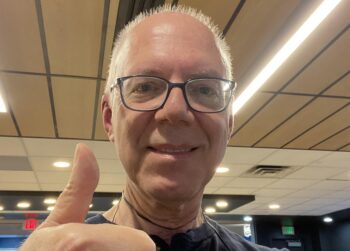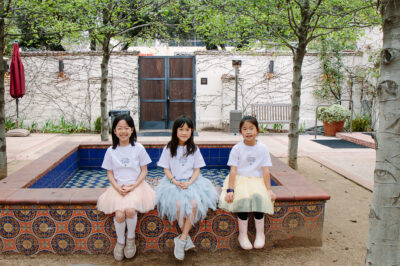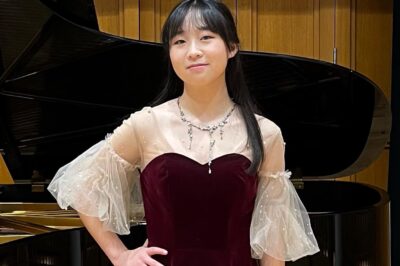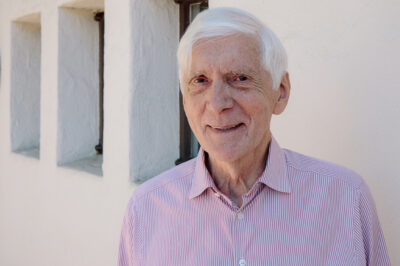Alan Fisher
Dr. Alan J. Fisher is an ENT-otolaryngologist and Head & Neck Plastic Surgeon in Arcadia, California. He has been in the medical field since 1981 and has been playing piano ever since he was 7 years old. He played mostly traditional works but has been able to explore new techniques since starting at PCM in 2019 with Elizabeth Babor. In this interview, he describes how his relationship with music has evolved over time and how he feels the same part of his brain is being used when he plays piano as when he performs surgery.
This interview was conducted on 7/17/24 and has been edited for length and clarity.

Can you share a little bit about your personal and professional background?
I was born in New Jersey and have studied piano since I was seven. I badgered my parents to buy me a piano, which they weren’t inclined to do. So they had my sister take lessons, as an insurance policy, and she dropped out after a couple of months so fortunately, I got to inherit the piano.
I played through school and college. When I was at the University of Rochester, I went to the Eastman School of Music for lessons then transferred to Hamilton my junior year where I played the organ which was fun because it adds things that your hands don’t do so it’s a whole-body experience.
Then I went to medical school in Chicago. I didn’t play much there but I was a house doctor at the Opera. Then I moved to LA and the Chicago Symphony had this Radiothon to conduct their orchestra so I bid on that and won. I got to conduct their New Year’s Eve concert. It was a murder mystery evening so I was the guest conductor and I conducted the Overture to Candide by Bernstein and then they immediately killed me. The whole evening revolved around who did it, which turned out to be the real conductor because he was jealous of the guest conductor.
Now that I’m in LA, I go to the L.A. Opera and the L.A. Phil. About five years ago I decided to take lessons again so I joined PCM and I’ve been with Elizabeth Babor since then, and she’s been great. It’s allowed me to continue my passion because once you have the passion, it never leaves you, it’s just something that is always part of you.
Do you have a different approach/set of goals for your lessons now compared to when you were a child? What are you looking for in your musical journey?
When I was a child, my piano teacher was old school and played with the State Academy of Music in Vienna. Whenever we’d learn a new piece, he’d write all over the sheet music in red pen and it had to be strictly his way. But since I’ve done that I decided I’m going to explore the things I want to do. Sure there’s a lot of great music I’d love to learn. But there’s a lot I’d love to explore that I will never have the chance to do unless I do it now. And under Elizabeth’s guidance, it’s been a lot of fun. She’s been a good sport about letting me do all kinds of interesting things like four-hand music. It’s different because I’m directing where things are going. As an adult student, she realizes I’m not on a professional path. This is strictly an advocational interest for me so it’s been great.
What role does music play in your life and how is this involved?
I was definitely a music nerd when I was a child. I didn’t know what that was, I didn’t know I was one, but when everybody else was doing sports or Boy Scouts, I was practicing piano. I didn’t feel I was missing something, I was doing what I wanted to do. My musical tastes haven’t really changed an awful lot. I still love the things I loved 50 years ago. Although I’m much more interested and excited about jazz now than I’ve ever been.
Why do you think that is?
I think it’s my realization of what I’ve been missing in terms of the improvisatory possibilities that I don’t get to explore in the classical realm. There are many wonderful jazz musicians out there, and I’m going to more jazz concerts and it’s really wonderful. I used to have the classical or opera station on my car radio, but now I have jazz. I wish I could play jazz, I don’t think that’ll ever happen, but I appreciate it a lot.
What music do you like to listen to?
When I was in high school I used to play organ in a rock band. We’d emulate the popular groups of the day like The Doors, The Beatles, Monkees. We’d do concerts and social events, so it was a lot of fun. I just visited a buddy of mine who was in my high school group, and he’s still playing bass in upstate New York. I got to go to one of his gigs, it was so much fun. I love how music is a bridge for so many connections, and it helps me maintain relationships. Like I said, the passions never leave you.
How do the skills you’ve gained from music lessons, either when you were a kid or now, show up in non-music areas? How does your work in the medical field show up in your music?
Playing the piano has enhanced my surgical skills. There’s a crossover between the dexterity you need as a pianist that carries over into acquiring surgical skills and the dexterity you need to perform very delicate operations. I do microscopic ear surgery, and I feel very comfortable under the microscope. Sometimes when I make a certain movement with my fingers, I actually feel like I’m playing the piano. It’s very odd. I can’t focus on that while I’m working, but I feel it. It’s all part of the same process. It may be different parts of your brain, but they cross over. You’re using your fingers for both.
Is there anything else you would like to add?
I’m grateful for PCM. I love going to their concerts and the Musical Interludes series. I’m very happy that it’s so close to me and that the quality is so high. We’re very lucky to have PCM. I’m looking forward to the next phase as the construction progresses. I’ll be here for a while.



